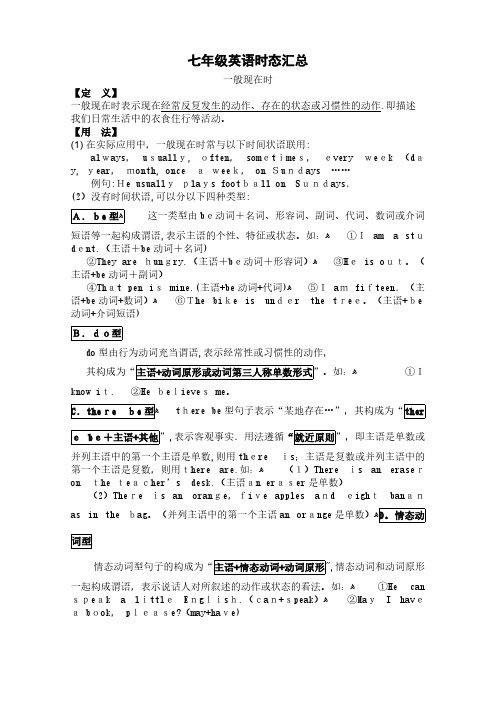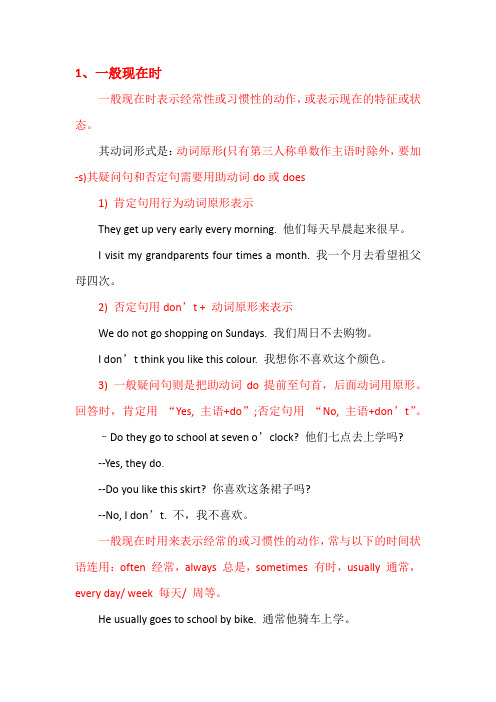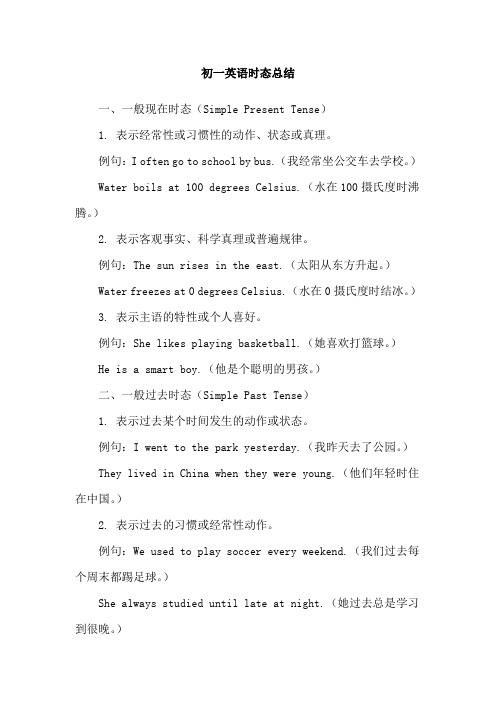七年级英语上册(含答案)时态时态
七年级英语上册一般现在时态句型转换人教新目标版

一般现在时态句型转换(新目标英语七年级上册unit1-6)(含答案)1.This is a white key. (对画线部分进行提问)2.Ben’s bag is yellow and red . (对画线部分进行提问)3.Cindy Green is fine. (对画线部分进行提问)4.Her name is Gina. (对画线部分进行提问)5.My phone number is 673-8220. (对画线部分进行提问)6.The boy’s name is Jack. (对画线部分进行提问)7.The picture is on the wall. (对画线部分进行提问)8.Your baseball is under the chair. (对画线部分进行提问)9.His book is on the desk. (对画线部分进行提问)10.Some balls are in the dresser. (对画线部分进行提问)11.My computer is on my desk. (对画线部分进行提问)12.He is Johnny. (改为一般疑问句)13.These are his parents. (改为一般疑问句)14.This is my sister. (改为一般疑问句)15.The baseball is under the bed. (改为一般疑问句)16.My key is on the bed. (改为一般疑问句)17.He has a tennis racket. (改为一般疑问句)18.I have some baseball bats. (改为一般疑问句)19.She has many things to do today. (改为一般疑问句)20.I like hamburgers . (改为一般疑问句)21.They have a TV. (改为一般疑问句)22.My English teacher is fine. (改为同义句)23.I’m Zhang Na. (改为同义句)24.Hello! My name is Gina. (改为同义句)25.I’m her son. (改为同义句)26.You are Tina. (改为否定句)27.These are my brothers. (改为否定句)28.The books are on the bookcase. (改为否定句)29.Three books are under the desk. (改为否定句)30.She has a computer game. (改为否定句)31.We have a big TV in our house. (改为否定句)32.Kate has some money in her pocket. (改为否定句)33.He likes ice cream. (改为否定句)34.I’m fine. (写出问句)35.Nice to meet you! (写出答语)36.Is that a dictionary (改为复数句)37.These are photos. (改为单数句)38.Is he your cousin (作肯定回答)39.Is Linda his sister (作否定回答)40.Is this a Chinese book (作否定回答)41.Those are dictionaries. (改为单数句)42.Is the CD on the sofa( 作肯定回答)43.Are the chairs next to the table (作否定回答)44.Where is my book (改为复数句子)45.They are on the sofa .( 改为单数句子)46.Are her pens on the dresser (作否定回答)47.Are your pens in the pencil case (作否定回答)48.Those are books .(改为单数句子)49.Do you have a baseball (作否定回答)50.Does he play sports every day (作肯定回答)51.You have a computer game. (用第三人称he作主语)答案 1. What’s this 2. What color is Ben’s bag3. How is Cindy Green4. What’s her name5. What’s your phone number6. What’s the boy’s name7. Where’s the picture8. Where’s my baseball9. Where’s his book10. Where’re some balls11. Where’s your computer12. Is he Johnny13. Are these his parents14. Is this your sister15. Is the baseball under the bed16. Is your key on the bed17. Does he have a tennis racket18. Do you have any baseball bats19. Does she have many things to dotoday20. Do you like humburgers21. Do they have a TV22. My English teacher is OK.23. My name is Zhang Na.24. Hello! I’m Gina.25. She is my mother.26. You aren’t Tina.27. These aren’t my brothers.28. These books aren’t on the bookcase.29. Three books aren’t under the desk.30. She doesn’t have computer game.31. We don’t have a big TV in ou rhouse.32. Kate doesn’t have any money in herpocket.33. He doesn’t like ice cream.34. How are you35. Nice to meet you,too!36. Are those dictionaries37. This is a photo.38. Yes, he is.39. No, she isn’t. 40. No, it isn’t.41. That is a dictionary.42. Yes, it is. 43. No, they aren’t. 44. Where are my books 45. It is on the sofa. 46. No, they aren’t. 47. No, they aren’t. 48. That is a book. 49. No, I’m not. 50. Yes, he does. 51. He has a computer game.。
七年级英语时态汇总一般现在时-一般过去时和现在进行时

七年级英语时态汇总一般现在时【定 义】一般现在时表示现在经常反复发生的动作、存在的状态或习惯性的动作.即描述我们日常生活中的衣食住行等活动。
【用 法】(1)在实际应用中,一般现在时常与以下时间状语联用:always,usually, often,sometimes,every week (day, year,month, once aweek, on Sundays ……例句:He usuallyplays football on Sundays.(2)没有时间状语,可以分以下四种类型:A.be型ﻫ这一类型由be动词+名词、形容词、副词、代词、数词或介词短语等一起构成谓语,表示主语的个性、特征或状态。
如:ﻫ①Iam a student.(主语+be动词+名词)②They are hungry.(主语+be动词+形容词)ﻫ③He is out。
(主语+be动词+副词)④That pen is mine.(主语+be动词+代词)ﻫ⑤I am fifteen.(主语+be动词+数词)ﻫ⑥The bike is under the tree。
(主语+be动词+介词短语)B.do型do型由行为动词充当谓语,表示经常性或习惯性的动作,其构成为“主语+动词原形或动词第三人称单数形式”。
如:ﻫ ①I know it. ②He believes me。
C.there be型ﻫthere be型句子表示“某地存在…”,其构成为“ther ebe+主语+其他”,表示客观事实.用法遵循“就近原则”,即主语是单数或并列主语中的第一个主语是单数,则用there is;主语是复数或并列主语中的第一个主语是复数,则用there are.如:ﻫ (1)There is an eraseron the teacher’s desk.(主语an eraser是单数)(2)There is an orange,five apples and eight bananas in the bag。
【必刷题】2024七年级英语上册动词时态辨析专项专题训练(含答案)

【必刷题】2024七年级英语上册动词时态辨析专项专题训练(含答案)试题部分一、选择题:1. He ______ (go) to the library every weekend when he was a student.A. goesB. wentC. will goD. has gone2. Look! The cat ______ (catch) a mouse.A. catchesB. caughtC. is catchingD. has caught3. By the end of next month, we ______ (finish) the project.A. will finishB. finishedC. have finishedD. finish4. She ______ (visit) her grandparents twice a month.A. visitsB. visitedC. is visitingD. has visited5. When I arrived at the party, they ______ (leave).A. leaveB. leftC. have leftD. had left6. My mother ______ (cook) dinner when I got home.A. cooksB. cookedC. is cookingD. was cooking7. If it ______ (rain) tomorrow, we will stay at home.A. rainsB. rainedC. will rainD. has rained8. He ______ (not see) his best friend for a long time.A. doesn't seeB. didn't seeC. hasn't seenD. won't see9. They ______ (be) in China for three years the end of this month.A. areB. wereC. have beenD. had been10. I ______ (do) my homework when my friend called me last night.A. doB. didC. have doneD. had done二、判断题:1. 一般现在时表示经常发生的动作或存在的状态。
人教版七年级上册英语时态讲解

1、一般现在时一般现在时表示经常性或习惯性的动作,或表示现在的特征或状态。
其动词形式是:动词原形(只有第三人称单数作主语时除外,要加-s)其疑问句和否定句需要用助动词do或does1) 肯定句用行为动词原形表示They get up very early every morning. 他们每天早晨起来很早。
I visit my grandparents four times a month. 我一个月去看望祖父母四次。
2) 否定句用don’t + 动词原形来表示We do not go shopping on Sundays. 我们周日不去购物。
I don’t think you like this colour. 我想你不喜欢这个颜色。
3) 一般疑问句则是把助动词do提前至句首,后面动词用原形。
回答时,肯定用“Yes, 主语+do”;否定句用“No, 主语+don’t”。
–Do they go to school at seven o’clock? 他们七点去上学吗?--Yes, they do.--Do you like this skirt? 你喜欢这条裙子吗?--No, I don’t. 不,我不喜欢。
一般现在时用来表示经常的或习惯性的动作,常与以下的时间状语连用:often 经常,always 总是,sometimes 有时,usually 通常,every day/ week 每天/ 周等。
He usually goes to school by bike. 通常他骑车上学。
I visit my grandparents every week. 我每个星期都去看祖父母。
She is always late for class. 她总是上课迟到。
My parents and I sometimes go out to eat. 我和父母有时出去吃饭。
It often rains here. 这儿常常下雨。
初一英语时态总结

初一英语时态总结一、一般现在时态(Simple Present Tense)1. 表示经常性或习惯性的动作、状态或真理。
例句:I often go to school by bus.(我经常坐公交车去学校。
) Water boils at 100 degrees Celsius.(水在100摄氏度时沸腾。
)2. 表示客观事实、科学真理或普遍规律。
例句:The sun rises in the east.(太阳从东方升起。
)Water freezes at 0 degrees Celsius.(水在0摄氏度时结冰。
) 3. 表示主语的特性或个人喜好。
例句:She likes playing basketball.(她喜欢打篮球。
)He is a smart boy.(他是个聪明的男孩。
)二、一般过去时态(Simple Past Tense)1. 表示过去某个时间发生的动作或状态。
例句:I went to the park yesterday.(我昨天去了公园。
) They lived in China when they were young.(他们年轻时住在中国。
)2. 表示过去的习惯或经常性动作。
例句:We used to play soccer every weekend.(我们过去每个周末都踢足球。
)She always studied until late at night.(她过去总是学习到很晚。
)3. 表示过去的真理或规律。
例句:Dinosaurs existed millions of years ago.(恐龙存在于几百万年前。
)The Earth was flat according to ancient beliefs.(根据古代的信仰,地球是平的。
)三、一般将来时态(Simple Future Tense)1. 表示将来某个时间或在某个时间之后发生的动作或状态。
例句:I will visit my grandparents next week.(下周我会去看望我的祖父母。
七年级的英语上册_一般现在时态句型转换_人教新目标版

一般此刻时态句型变换(新目标英语七年级上册unit1-6 )(含答案)This is a white key. (对画线部分进行发问)Ben’ s bag is yellow and red . ( 对画线部分进行发问)Cindy Green is fine. ( 对画线部分进行发问)Her name is Gina. (对画线部分进行发问)My phone number is 673-8220. ( 对画线部分进行发问)The boy ’ s name is Jack. (对画线部分进行发问 )The picture is on the wall. ( 对画线部分进行发问 )Your baseball is under the chair. ( 对画线部分进行发问)His book is on the desk. (对画线部分进行发问 )Some balls are in the dresser. ( 对画线部分进行发问)My computer is on my desk. (对画线部分进行发问)He is Johnny. (改为一般疑问句 )These are his parents. ( 改为一般疑问句)This is my sister. ( 改为一般疑问句)The baseball is under the bed. ( 改为一般疑问句 )My key is on the bed. ( 改为一般疑问句 )He has a tennis racket. ( 改为一般疑问句 )I have some baseball bats. ( 改为一般疑问句 )She has many things to do today. ( 改为一般疑问句 )I like hamburgers . ( 改为一般疑问句)They have a TV. (改为一般疑问句)My English teacher is fine. ( 改为同义句 )I ’ m Zhang Na. (改为同义句 )Hello! My name is Gina. (改为同义句 )I ’ m her son. (改为同义句 )You are Tina. (改为否认句 )These are my brothers. ( 改为否认句 )The books are on the bookcase. ( 改为否认句 ) Three books are under the desk. (改为否认句 )She has a computer game. ( 改为否认句 )We have a big TV in our house. ( 改为否认句 ) Kate has some money in herpocket. ( 改为否认句 ) He likes ice cream. ( 改为否认句 )I ’ m fine. ( 写出问句 )Nice to meet you! ( 写出答语 )Is that a dictionary ( 改为复数句 )These are photos. ( 改为单数句 )Is he your cousin ( 作一定回答 )Is Linda his sister ( 作否认回答 )Is this a Chinese book ( 作否认回答 )Those are dictionaries. ( 改为单数句 )Is the CD on the sofa( 作一定回答 )Are the chairs next to the table ( 作否认回答 )Where is my book ( 改为复数句子)They are on the sofa .( 改为单数句子)Are her pens on the dresser ( 作否认回答)Are your pens in the pencil case(作否认回答)Those are books .(改为单数句子)Do you have a baseball (作否认回答 )Does he play sports every day ( 作一定回答 )You have a computer game. (用第三人称he 作主语 )答案What’ s thisWhat color is Ben’ s bagHow is Cindy GreenWhat’ s her nameWhat’ s your phone numberWhat’ s the boy ’ s nameWhere’ s the pictureWhere’ s my baseballWhere’ s his bookWhere’ re some ballsWhere’ s your computerIs he JohnnyAre these his parentsIs this your sisterIs the baseball under the bedIs your key on the bedDoes he have a tennis racketDo you have any baseball batsDoes she have many things to do todayDo you like humburgersDo they have a TVMy English teacher is OK.My name is Zhang Na.Hello! I ’Ginam.She is my mother.You aren ’ t Tina.These aren ’ t my brothers.These books aren ’ t on the bookcase.Three books aren ’ t under the desk.She doesn ’ t have computer game.We don ’ t have a big TV in our house. Kate doesn ’ t have any money in her pocket. He doesn ’ t like ice cream.How are youNice to meet you,too!Are those dictionariesThis is a photo.Yes, he is.No, she isn ’ t.No, it isn ’ t.That is a dictionary.Yes, it is. No, they aren ’ t.Where are my booksIt is on the sofa.No, they aren ’ t.No, they aren ’ t.That is a book.No, I’ m not.Yes, he does.51. He has a computer game.。
七年级上册英语知识点时态
七年级上册英语知识点时态英语时态一直是学习英语的难点之一,有时态的正确使用能够帮助我们更精准地表达出自己的意思。
那么,让我们来一起回顾一下七年级上册英语的时态知识点吧!一、一般现在时(Present Simple)一般现在时表示经常或习惯性发生的动作或状态,其构成为:主语+动词原形/第三人称单数形式。
例如:I watch TV every day.(我每天都看电视。
)He likes playing basketball.(他喜欢打篮球。
)二、一般过去时(Past Simple)一般过去时表示发生在过去某个时间里的动作或状态,其构成为:主语+动词过去式。
例如:I went to the park yesterday.(我昨天去了公园。
)She played the piano when she was young.(她小时候弹钢琴。
)三、一般将来时(Future Simple)一般将来时表示将来某个时间要发生的动作或状态,其构成为:主语+will+动词原形。
例如:I will go to Beijing next week.(我下周去北京。
)They will have a party this weekend.(他们这个周末开派对。
)四、现在进行时(Present Continuous)现在进行时表示现在正在进行的动作或状态,其构成为:主语+be动词(am/is/are)+动词ing形式。
例如:She is reading a book now.(她现在在看书。
)They are playing football in the park.(他们正在公园里踢足球。
)五、过去进行时(Past Continuous)过去进行时表示过去某个时间里正在进行的动作或状态,其构成为:主语+was/were+动词ing形式。
例如:I was studying at this time yesterday.(昨天这个时候我正在学习。
七年级上册英语时态归纳
七年级上册英语时态归纳七年级上册英语主要涉及以下时态:1. 一般现在时:表示现在常态或经常发生的动作或状态。
- I eat breakfast every morning.(我每天早上吃早餐。
)- He likes to play football.(他喜欢踢足球。
)2. 一般过去时:表示过去发生的动作或状态。
- I played basketball with my friends yesterday.(昨天我和朋友一起打篮球。
)- She went to the movies last night.(她昨晚去看电影了。
)3. 将来时:表示将来要发生的动作或状态。
- We will have a party next week.(我们下周要开派对。
)- I am going to visit my grandparents this weekend.(这个周末我打算去拜访我的祖父母。
)4. 现在进行时:表示现在正在进行的动作。
- They are studying for the exam.(他们正在为考试而学习。
) - I am watching TV at the moment.(我正在看电视。
)5. 过去进行时:表示过去某个时间点正在进行的动作。
- She was reading a book when I called her.(我打电话给她的时候,她正在看书。
)- They were playing soccer in the park at 5 pm.(他们在下午5点在公园里踢足球。
)6. 现在完成时:表示过去发生的动作与现在产生的影响或结果。
- I have finished my homework.(我已经完成了我的作业。
)- She has lived in this city for ten years.(她在这个城市已经住了十年了。
)这些是七年级上册英语的主要时态,通过学习这些时态,你将能够更好地理解和运用英语语法。
【必刷题】2024七年级英语上册一般现在时态专项专题训练(含答案)
【必刷题】2024七年级英语上册一般现在时态专项专题训练(含答案)试题部分一、选择题:1. He _______ (go) to school bus every day.A. goesB. goes toC. goingD. go2. My mother _______ (cook) dinner at 7 p.m. every evening.A. cookB. cooksC. is cookingD. cooked3. We _______ (watch) a movie on weekends.A. watchB. watchesC. watchingD. is watching4. She _______ (visit) her grandparents once a month.A. visitB. visitsC. is visitingD. visited5. They _______ (play) soccer in the afternoon.A. playsB. playC. is playingD. played6. It _______ (rain) a lot in summer.A. rainsB. rainC. rainedD. is raining7. He _______ (do) his homework every evening.A. doB. doesC. doingD. did8. She _______ (have) breakfast at 7 a.m. every morning.A. haveB. hasC. havingD. had9. We _______ (read) books before going to bed.A. readB. readsC. readingD. is reading10. They _______ (travel) to different countries every year.A. travelB. travelsC. is travelingD. traveled二、判断题:1. 一般现在时态表示经常发生的动作或习惯性的行为。
初一上英语常用语法知识——动词时态(含答案解析)
一、选择题1.This pair of pants______gray. What color________your pants?A.are; are B.is;is C.is;are C解析:C【解析】【分析】【详解】句意:这条裤子是灰色的。
你的裤子是什么颜色的?考查be动词。
is是,一般用在主语是单数或者不可数名词之后;are是,一般用在可数名词复数之后。
根据题目中的pair来做题,当pants,shoes这类成双成对的词由pair来修饰时,谓语动词的单复数取决于pair的单复数。
根据第一个空格前的pair是单数,故第一个空格应该填单数is。
因为pants,shorts和glasses都是成双成对的出现,当做主语时,谓语动词用复数。
故第二个空格用are。
故选C。
2.—Do you like watching cooking programs on TV?—No, I don’t , but my twin brother . He's very fond of cooking.A.does B.do C.is D.are A解析:A【解析】【详解】句意:——你喜欢看电视上的烹饪节目吗?——不,我不喜欢,但是我的双胞胎哥哥/弟弟喜欢。
他非常喜欢烹饪。
此处用助动词代替动词,用来表示刚提到的动作,以避免重复,排除C和D;主语是my twin brother,第三人称单数,助动词用第三人称单数形式does。
故选A。
3.Parents always hope their children a happy and healthy life.A.to live B.can live C.living D.should live B解析:B【解析】【详解】句意:父母总是希望他们的孩子能过得健康快乐。
考查宾语从句。
hope后要么直接接动词不定式作宾语,要么接宾语从句。
此处是省略引导词that的宾语从句,此处缺从句的谓语,所以用情态动词+动词原形作谓语,又此处不构成虚拟语气,所以排除D,故选B。
- 1、下载文档前请自行甄别文档内容的完整性,平台不提供额外的编辑、内容补充、找答案等附加服务。
- 2、"仅部分预览"的文档,不可在线预览部分如存在完整性等问题,可反馈申请退款(可完整预览的文档不适用该条件!)。
- 3、如文档侵犯您的权益,请联系客服反馈,我们会尽快为您处理(人工客服工作时间:9:00-18:30)。
2019年全国各地中考英语试题考点分类解析汇编:时态(2019•武汉)---Sorry,Tom.I can't find the book you _____ _me.---It's OK.I don't need it any more.()A.lend B.have lent C.will lend D.lent【考点】一般过去时.【分析】--抱歉,汤姆.我找不到你借给我的那本书.--没关系,我不再需要它了.【解答】答案D.结合选项可知句意:我找不到你借给我的那本书.可知是我找不到你之前借过我的书了,是描述过去的事,所以用一般过去时,lend的过去式为lent,故选D.【点评】一般过去时表示过去某个时间里发生的动作或状态;过去习惯性、经常性的动作、行为;过去主语所具备的能力和性格.基本结构:主语+谓语(动词过去式)+句子其他成分;主语+was/were+形容词/名词/介词短语+过去时间;否定形式①was/were + not;②在行为动词前加didn't,同时还原行为动词;一般疑问句Did+主语+do+其他.(2019•宁夏)-You can't smoke here.-Sorry,I ______ the sign.()A.don't see B.didn't seeC.haven't seen D.won't see【考点】一般过去时.【分析】--你不能在这里吸烟.--抱歉,我没看到那个指示牌.【解答】答案:B.根据语境推测句意是"--你不能在这里吸烟.--抱歉,我没看到那个指示牌."设空处的动作"没看见"发生在过去,即第一个人说话之前,所以用一般过去时.一般过去时的构成是:主语+动词的过去式;变否定句在主语后面加助动词didn't加动词原形,故答案为B.【点评】本题考查了动词的时态.做题时,一定要特别关注有关的时间短语,这是判断句子时态的标志.在没有时间状语的情况下可以联系上下文根据语境来做出正确判断.(2019•桂林)Mrs Black some flowers in the garden yesterday.()A.picks B.picked C.is picked【考点】一般过去时.【分析】布莱克夫人昨天在花园里摘了一些花.【解答】答案:B.根据时间状语yesterday判断用一般过去时.一般过去时的构成是:主语+动词的过去式;pick动词的过去式是picked.故答案为B.【点评】本题考查了动词的时态.做题时,一定要特别关注有关的时间短语,这是判断句子时态的标志.在没有时间状语的情况下可以联系上下文根据语境来做出正确判断.(2019•呼和浩特)---I have to be off right now.---What a pity! I______ you could stay a little longer with us.()A.thought B.am thinkingC.think D.was thinking【考点】一般过去时.【分析】--我必须立刻离开了.--真遗憾!我还以为你能够和我们多呆一会儿.【解答】答案:A.根据语境推测设空处所在句子的句意是"我还以为你能够和我们多呆一会儿."结合句意判断设空处的动词"认为"发生在过去,即第一个人说话之前,所以句子用一般过去时.一般过去时的构成是:主语+动词的过去式;故答案为A.【点评】本题考查了动词的时态.做题时,一定要特别关注有关的时间短语,这是判断句子时态的标志.在没有时间状语的情况下可以联系上下文根据语境来做出正确判断.(2019•连云港)-Did Billy and Anna find a way out at last?-Yes,they _____ a plan and did it.()A.were working out B.worked outC.are working out D.have worked out【考点】一般过去时.【分析】--Bill和Anna最后找到办法了吗?--是的,他们制定了一个计划并且实施了.【解答】答案:B.根据问句中的助动词did和答语中的and did it判断设空处所在的句子用一般过去时.句意是"他们制定了一个计划并且实施了."一般过去时的构成是:主语+动词的过去式;故答案为B.【点评】本题考查了动词的时态.做题时,一定要特别关注有关的时间短语,这是判断句子时态的标志.在没有时间状语的情况下可以联系上下文根据语境来做出正确判断.(2019•无锡)My mind wasn't on what he was saying so I'm afraid I _____half ofit.()A.missed B.was missingC.will miss D.would miss【考点】一般过去时.【分析】我的心不在他所说的话上,所以恐怕我错过了他一半的话.【解答】答案:A 根据"My mind wasn't on what he was saying"可知我走神这一动作是过去发生的.而他说话和我走神是同时发生的,那么就可以判断我错过了他一半的话也是过去的动作.故应该用一般过去时.A选项为一般过去时;B选项为过去进行时;C选项为一般将来时;D选项为过去将来时.故选A.【点评】本题考查一般过去时.本题的关键是根据句意来判断动作发生的时间,进而判断正确的时态.(2019•新疆)-Have you read this book?-Yes,I it two weeks ago.()A.is reading B.have read C.will read D.read 【考点】一般过去时.【分析】你已经读过这本书了吗?--是的,我两周之前读的这本书.【解答】答案:D 根据时间状语"two weeks ago"(两周前),可知读书这一动作发生在过去,应该用一般过去时.read的过去式为read.故选D.【点评】本题考查一般过去时.判断时态的题目,要找到时间状语,进而判断正确的答案.(2019•随州)My husband always ______me flowers every week before we gotmarried,but now he never______.A.sent;does B.sends;doesC.was going to send;do D.sent;do【考点】一般过去时.【分析】在我们结婚之前,我丈夫总是每周送花给我,但是现在他再也不这样做了.【解答】答案:A 根据第一句的时间状语"every week before we got married"可知时态为一般过去时.send的过去式为sent.根据第二个空的时间now,可知用一般现在时.主语he为第三人称单数,故用does.故选A.【点评】本题考查时态辨析.要根据时间状语先判断时态问题.其次根据时态的构成选出正确答案即可.(2019•丹东)-I have ever seen Alice in WonderlandⅡ(《爱丽丝梦游仙境Ⅱ》).-When ______?-Two weeks ago.()A.did you see it B.have you seen itC.do you see it D.will you see it【考点】一般过去时.【分析】--我曾经看过电影《爱丽丝梦游仙境Ⅱ》.--你什么时候看的?--两个星期以前.【解答】答案:A.根据答语"两个星期以前.",结合语境,推测问句的意思是"你什么时候看的?",询问动作发生的具体时间,用一般过去时,特殊疑问句中要借助于助动词did,故答案为A.【点评】本题考查了动词的时态.做题时,一定要特别关注有关的时间短语,这是判断句子时态的标志.在没有时间状语的情况下可以联系上下文根据语境来做出正确判断.(2019•长沙)-Your coat fits you well.-Thank you.I_______ it when I was on vacation.()A.have bought B.buyC.bought【考点】一般过去时.【分析】你的大衣很适合你,--谢谢.我度假时买的.【解答】答案:C 根据时间状语从句"when I was on vacation",可知动作发生在过去,应该用一般过去时.have bought为现在完成时的构成;buy为一般现在时的构成;bought为一般过去时的构成.故选C.【点评】本题考查一般过去时.做题时需要根据时间状语来判断出动作发生的时间,进而判断出正确的时态.(2019•大庆)I go sailing on the lake.()A.am used B.am used to C.used toD.used【考点】一般过去时.【分析】我过去常常在那个湖里进行帆船运动.【解答】答案:Cused to 表示"过去常常",后面跟动词原形,be used to表示"习惯于",后面跟动词的ing形式.本题中,根据设空处后面的动词原形推测句意是"我过去常常在那个湖里进行帆船运动",所以选C.【点评】本题考查固定句式:used to 表示"过去常常",后面跟动词原形,be used to 表示"习惯于",后面跟动词的ing形式.(2019•咸宁)--I don't know if it _________tomorrow.--Well,if it __________,the school sports meet will be canceled.()A.will rain; will rain B.rains; will rainC.will rain; rains D.rains; rains【考点】一般将来时;一般现在时.【分析】--我不知道明天是否会下雨.--哦,如果明天下雨的话,校运动会将被取消.【解答】答案:C.根据I don't know if it _________tomorrow,可知这里if是"是否"的意思,引导的是宾语从句,根据宾语从句的时态的用法,主句是一般现在时,从句应该根据自身的时间决定时态,又因为tomorrow,所以应该用will rain;再根据if it __________,the school sports meet will be canceled,可知这里if是"如果",引导的是条件状语从句,条件状语从句的时态用法是"主将从现",故用rains.故选C.【点评】本题实际考查的是if的用法.在做题时,首先应该分清if分别是引导的什么从句,然后if根据在这些从句中的用法,来决定句子的时态.(2019•临沂)--Did you call Jenny?--Oh no,I forgot.I _____ her right away.()A.called B.have calledC.call D.will call【考点】一般将来时.【分析】--你给Jenny打电话了吗?--哦,不,我忘了.我会立刻给她打电话.【解答】答案:D.根据答语中时间状语right away"立刻,马上"可知,叙述的是在将来发生的事情,故用一般将来时态,一般将来时态的结构为will+动词原形,故选:D.【点评】根据时间状语去判断事情发生的状态,从而选择应用恰当的时态.(2019•黄石)Many scientists believe that robots ______ able to talk like humans in 50years.()A.were B.are C.will beD.have been【考点】一般将来时.【分析】许多科学家认为五十年后机器人能和人类一样进行交谈.【解答】答案:C.本题考查的是动词的时态,根据题干in 50 years可知这是表示将来时间的时间短语,应该用一般将来时,其结构是will+动词原形,故选C.【点评】一种特定的时态都有其相应的时态标志,寻找其时态标志并加以认真分析可以巧解时态试题.本题中in+时间段是一般将来时的时态标志,同学们在做题时若能充分利用这些时态标志,同时结合句子语境,就可很快选出正确答案.(2019•广东)With the development of science and technology,robot cooks ______in our families in the future.()A.appear B.appearedC.will appear D.were appearing【考点】一般将来时.【分析】随着科学技术的发展,在未来机器人厨师将出现在我们的家庭中.【解答】答案:C.根据in the future可知,此句表示动作发生在将来,所以用一般将来时态;一般将来时态结构为:will+动词原形,故选C.【点评】判断动词的时态,要通过所给的时间状语、提示词或语境去判断动词存在的状态.一般将来时态结构为:will+动词原形.(2019•泉州)-Have you watched the new movie Kung Fu Panda 3,Kelly?-Not yet.I it with my classmate tonight.()A.will watch B.was watchingC.have watched【考点】一般将来时.【分析】--Kelly,你看了新影片《功夫熊猫3》了吗?--还没有.我和我的同学今晚将会看.【解答】答案:A.根据答语中时间状语tonight"今晚"可知,叙述的是在将来发生的事情,故用一般将来时态,一般将来时态的结构为will+动词原形,故选:A.【点评】根据时间状语去判断事情发生的状态,从而选择应用恰当的时态.(2019•玉林)---How long ______ you ______ Little Women?---I am due to return it in two weeks.()A.have;borrowed B.will;lendC.will;keep D.have;got【考点】一般将来时.【分析】你将会借《小妇人》多久?--我将在两周内归还.【解答】答案:C 根据how long可知提问的是多长时间,是动作持续的时间段.而borrow、get与lend为瞬间动词,不可持续一段时间.故动词应该用keep.根据答句中的时间状语in two weeks,可知此时间状语是用于一般将来时的.故问句也应该用一般将来时.故选C.【点评】本题考查时态和持续性动词.此题容易出错,就容易错在瞬间动词和持续动词的区别上,做题时需要更加注意.(2019•邵阳)We ______ for a picnic if it ______ rain this Sunday.()A.will go;doesn't B.will go;won'tC.go;doesn't【考点】一般将来时;一般现在时.【分析】如果这周日不下雨我们将去野餐.【解答】答案:A;根据后面的时间短语this Sunday和连词if可知这是一个条件状语从句,而且是典型的主将从现句子,主句用一般将来时,从句用一般现在时.句中主语是we,后跟will,if引导的从句中rain是实意动词,用助动词do或doesn't 修饰.这句话的意思就是:如果这周日不下雨我们将去野餐.故选A.【点评】解答该题的关键是掌握时态的表达,句中的时间短语是重要的判断标志.(2019•十堰)-I heard your father gone to Beijing on business.-Yes,And he _____ in three weeks.()A.will return B.has returnedC.returned D.returns【考点】一般将来时.【分析】--我听说你父亲出差去北京了?--是的.他将在三周后回来.【解答】答案:A;时间状语in three weeks与一般将来时连用,根据句中的时间短语in three weeks可知该句为一般将来时态:will(shall)+动词原形;故选A.【点评】掌握时态的正确表达是做好此类题型的关键,还要从句意着手,根据句意作出解答;所以,平时的学习中要多熟练掌握语法,才能很好的完成.(2019•齐齐哈尔)I wonder if she me when .()A.calls,she arrivesB.will call,she arrivesC.calls,will she arrive【考点】一般将来时;一般现在时.【分析】我想知道当她到了的时候她是否会给我打电话.【解答】答案:B.第一个设空处考查if引导的宾语从句的时态,主句I wonder是一般现在时,根据句意"我想知道当她到了的时候她是否会给我打电话.""打电话"这件事还未发生,所以用一般将来时,一般将来时的构成是:主语+will+动词原形;第二个设空处考查when引导的时间状语从句的时态,句意为:"我想知道当她到了的时候她是否会给我打电话.",从句用一般现在时代替一般将来时,所以选B.【点评】本题考查了动词的时态.做题时,一定要特别关注有关的时间短语,这是判断句子时态的标志.在没有时间状语的情况下可以联系上下文根据语境来做出正确判断.(2019•包头)一Excuse me,is there a double room available at the moment?一I am not sure,but just a minute,I it for you.()A.check B.was checkingC.will check D.have checked【考点】一般将来时.【分析】--打扰了,目前有双人房间可安排吗?--我不确定,但是稍等一下,我为你查一查.【解答】答案:C.根据答语的语境"我不确定,但是稍等一下,我为你查一查."判断设空处的动作在说话时刻还没有发生,所以用一般将来时,一般将来时的构成是:主语+will+动词原形,故选C.【点评】本题考查了动词的时态.做题时,一定要特别关注有关的时间短语,这是判断句子时态的标志.在没有时间状语的情况下可以联系上下文根据语境来做出正确判断.(2019•随州)-Have you returned the book to the library yet?-Not yet.Don't worry.I ______it soon.()A.return B.returnedC.have returned D.will return【考点】一般将来时.【分析】--你已经把那本书还给图书馆了吗?--还没有.别担心,我马上就还.【解答】答案:D.根据答语的语境"Not yet.Don't worry.I ______it soon"判断设空处的动作在说话时刻还没有发生,所以用一般将来时,一般将来时的构成是:主语+will+动词原形,故选D.【点评】本题考查了动词的时态.做题时,一定要特别关注有关的时间短语,这是判断句子时态的标志.在没有时间状语的情况下可以联系上下文根据语境来做出正确判断.(2019•黔南州)The winter holiday is coming,so the twins as well as Alex ____ toSanya for vacation.()A.go B.goes C.are going D.is going【考点】一般将来时.【分析】寒假就要到了,所以双胞胎和Alex将要去三亚度假.【解答】答案:C.根据The winter holiday is coming结合语境推测句意是"寒假就要到了,所以双胞胎和Alex将要去三亚度假."判断设空处的动作在说话时刻还没有发生,所以用一般将来时,一般将来时的构成是:主语+will(be going to )+动词原形,另外主语后面有as well as时,谓语动词由前面的主语决定,the twins是复数名词,be 动词用are,故选C.【点评】本题考查了动词的时态.做题时,一定要特别关注有关的时间短语,这是判断句子时态的标志.在没有时间状语的情况下可以联系上下文根据语境来做出正确判断.(2019•江西)-May I speak to Mrs. Black?-Sorry,mum can't come to the phone now.She a shower.()A.has B.had C.is havingD.was having【考点】现在进行时.【分析】--我可以和Black夫人通话吗?--抱歉,妈妈现在不能来接电话.她在冲凉.【解答】答案:C.根据Sorry,mum can't come to the phone now说明了妈妈不能来接电话因为她在冲凉,now此刻,现在,一般用于现在进行时当中,因此该句用现在进行时,现在进行时的构成:主语+is/am/are+动词的ing…,主语是she,故答案为:is having,故选C.【点评】本题旨在考查现在进行时,now是判断时态的关键词,类似的常见特征词还有:Look,Listen,It's seven o'clock now.现在进行时的构成:主语+is/am/are+动词的ing….。
